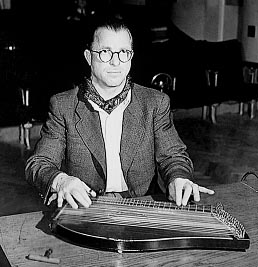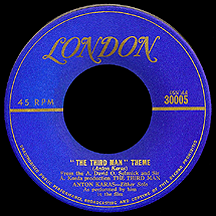ANTON KARAS
"The Third Man" Theme
In the fall of 1948, just before filming of Graham Greene's novel The Third Man commenced in Vienna, Austria, a welcoming party was held for director Carol Reed, his crew and some of the cast members. In the corner of the room there was a man playing a unique stringed device called a zither, something Reed had never seen nor heard; fascinated by the sound of the instrument and Anton Karas, the musician playing it, he decided on the spot that he would use this strange apparatus, and nothing else, for the music soundtrack of his film. Vienna waltzes? Too obvious! The zither? Too cool! The studio executives financing the project, including Hungarian-born producer Alexander Korda and American mogul David O. Selznick, disagreed with Reed's choice. It was rare for a single musical instrument to be used to score an entire film, but eventually the director had his way and the zither was from then on associated with one of the greatest movies ever made.
Had the hand of fate not placed Karas at the party that evening, he likely would never have become famous. Born in 1906, he had lived in Vienna his entire life and first became familiar with the zither during his adolescence. He worked in an auto factory while in his teens, then studied at Vienna's University of Music and Performing Arts. In the late 1920s, Anton began playing zither at a wine bar in the Vienna Woods (until the mid-20th century, the most notable use of the instrument had been as a featured passage in Johann Strauss II's 1868 composition "Tales from the Vienna Woods," resulting in the zither being more popular in that part of the world than anywhere else).
Reed set up his hotel room as a recording studio for Karas, stuffing pillows against the doors in a stopgap attempt at soundproofing. By late December '48 the grueling location shoot (requiring three crews to work day and night) was finished; additional scenes were filmed, starting in January 1949, at Shepperton Studios in London. Karas made the trip for what turned out to be three months of long hours scoring the film, growing more homesick for Vienna with each passing day. The Third Man, starring Joseph Cotten, Trevor Howard and brooding Italian actress Alida Valli (credited simply as Valli) opened in London in August 1949 to critical raves and substantial box office (ending up as the year's top moneymaker in the U.K.), but it was Karas's unusual music score that really got the fans fired up. Many felt his music perfectly accentuated the seedy atmosphere of Vienna, with its glistening cobblestone streets and bombed-out buildings, in addition to the film's tense ferris wheel scene and action-packed sewer chase, all wrapped around the intriguing mystery (is he alive or dead?) of the man called Harry Lime (brilliantly played by the notoriously difficult-to-work-with Orson Welles). A recording of "The 'Harry Lime' Theme" was rushed into release on Britain's Decca label and became a major hit.

At the Cannes Film Festival held in September '49, the movie won the Palme d'Or (the festival's grand prize). It first appeared on American screens in February 1950; at about the same time, Carol Reed was unexpectedly nominated by the Academy of Motion Picture Arts and Sciences in the Best Director category for his earlier film The Fallen Idol. Anton's theme song, released as "'The Third Man' Theme" on London, Decca's U.S. label, hit the charts two weeks after the picture debuted in theaters. This odd-sounding instrumental recording literally took America by storm, holding the number one position on the Billboard charts for eleven weeks, from April through July. Third Man Mania had firmly taken hold; Canadian bandleader Guy Lombardo put out a version, featuring guitar in place of zither, titled "The 3rd Man Theme" (a variation used on some of the film's promotional posters as well) and it nestled at the number two spot during most of Karas's run at the top. Though he was now an international celebrity, Anton preferred a simpler life in his Austrian home. But demand could not be denied; he toured the world, playing in front of sold out crowds and for royalty in several countries.
In May 1950, the movie won the British Film Academy's award for Best British Film (as Reed's The Fallen Idol had the previous year). In the U.S. a year later, The Third Man picked up three Oscar nominations including a second consecutive Best Director nod for Carol Reed (an award he eventually won, in 1969, for Oliver!), plus one for Film Editing and a win for Robert Krasker's innovative (and ultimately often-imitated) black and white cinematography. In the years since, the movie's legend has grown; today it's considered one of the greatest ever made and, arguably, the number one British film of all time.
Karas devised a way to reap long-term profits from his evanescent moment of glory while being able to stick close to home most of the time. Once the commotion surrounding the movie diminished, he returned to Vienna and opened his own wine bar, calling it, appropriately, Der Dritte Mann (in English that's - what else? - The Third Man); it became a hot night spot and celebrity hangout frequented by millionaires and movie stars, including Orson Welles himself.
Though he made only a handful of recordings afterward, Karas occasionally embarked on performance tours around the globe due to a lasting fascination people had with his one-and-only international smash. In 1964 he took his trusty zither to Rome and backed singer Rita Pavone on music for the soundtrack of her short-lived TV series Gian Burrasca. He continued to work his zither magic until his death in 1985 at the age of 78. "'The Third Man' Theme" was the biggest instrumental hit of the 1950s as well as the decade's best-selling movie theme. With eleven weeks at number one in the U.S. and what seemed (to anyone outside Central Europe, at least) an abrupt disappearance, Anton Karas achieved the dubious honor of being the most successful "one-hit wonder" of the 20th century, a distinction he embraced...and made the most of.


